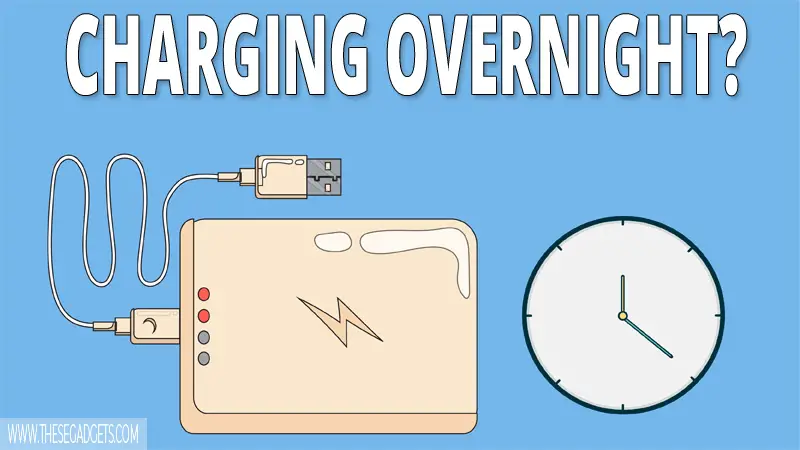Most of us want to leave the power bank to charge overnight so we can have it ready in the morning. But, can you?
You can leave high-quality power banks that come with a built-in protective circuit to charge overnight. The built-in circuit prevents the power bank to overcharge and overheat. However, you should never leave a low-quality/cheap power bank to charge overnight.
Contents
Can You Overcharge a Power Bank?
No, you can’t overcharge a modern (high-quality) power bank because they have built-in protection circuits that prevent overcharging. Once a power bank is fully charged, the protection circuits will stop the charging process automatically.
The built-in protection circuits are electronic mechanisms designed to protect the power bank’s battery and prevent it from being damaged due to overcharging, overheating, overcurrent, or short circuits.
However, you can overcharge low-quality and cheap power banks. Low-quality power banks may not have in-built protection circuits, making them more prone to overcharging.
How To Know If You Can Leave Your Power Bank Charging Over-Night or Not?
To know if you can leave your power bank to charge overnight, check the user manual, check for safety certifications, observe charging behavior, and use common sense and prioritize safety.
The user manual will have specific recommendations for charging times, charger type, and everything related to charging. It may also have clear guidelines on whether it is safe to leave the power bank charging overnight.
Check if the power bank has safety certifications. High-quality power banks undergo strict testing to see if they meet safety standards, such as CE, FVV, or RoHS. These safety certifications indicate that the power bank has passed the safety requirement and that leaving it charging overnight is safe. Ensure to read about the safety certifications your power bank has and if it’s safe to leave it charge overnight.
Observer charging behavior after the power bank is fully charged. If your power bank has LED or battery indicator lights, check them once the battery is full (or once the recommended charging time has passed). If the battery indicator lights indicate that the battery is full but it’s still getting charged, don’t leave it charging overnight.
You can also check the charger to know if the power bank is getting charged. Wait for the power bank to fully charge and leave the charger connected for 10-20 minutes. If the charger is still hot 20 minutes after the power bank was fully charged, the battery doesn’t have an in-built protection circuit. That’s because, once the protection circuit kicks in, the charger will start to cool off even if connected to a device.
What Happens if a Power Bank Is Overcharged?
If a power bank is overcharged, the following things will happen.
1. Battery Damage
Overcharging a power bank will damage its battery. The prolonged charging will lead to increased heat generation, which will decrease the battery performance. Continuous overcharging will lead to a reduced battery capacity, shorter overall battery lifespan, or even complete battery failure.
2. The Power Bank Gets Too Hot
It’s very likely for the battery to get warm while using or charging it, but the power bank shouldn’t get too hot to touch. If that happens, then we are dealing with an overheating power bank.
If your power bank is overheating then it might just need a little rest, plug out the power bank and let it rest for a few hours or a day. After that, plug it in and use it for no more than 2 hours, make sure to check if it’s overheating or not. If the power bank is still overheating after resting then you should send it for repair.
The power bank gets overheated from the thermal runaway. Therman runaway happens when the cell battery temperature increases the current (I) of the battery, and that increases the whole battery temperature.
3. Swollen Power Bank
As mentioned above, most power banks come with lithium batteries. Lithium batteries are known to stress if they stay at a high voltage for a long period of time.
Every time the batteries stress, overcharge or overheat, they lose some battery capacity, meaning they charge less. Studies have shown that overcharging can cause lithium batteries to swollen after a while. If that’s the case, then you need a new power bank.
